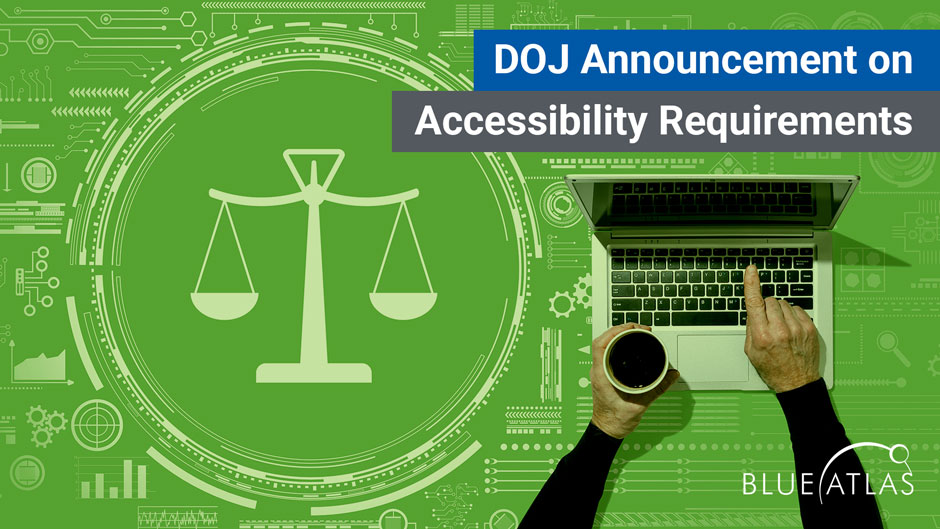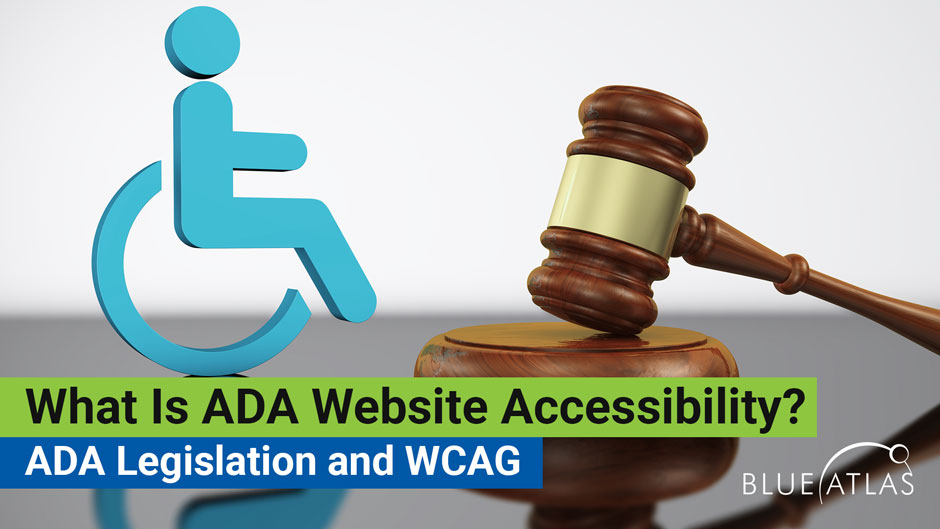DOJ Announcement on Accessibility Requirements and What it Means

In the U.S., specific federal regulations apply to accessibility requirements, such as the ADA (Americans for Disabilities Act) and associated updates (along with specific state requirements). These regulations provide important access to businesses and other institutions for more than 1 in 4 Americans who have some kind of disability.
Not all of this legislation was made with websites in mind, which means it’s not always obvious how the requirements apply to websites. Clarification throughout the years has been very important – and in early 2022 we received one of the most important clarifications seen in decades. The Department of Justice (DOJ) has issued official guidance on how the ADA affects online content. Here’s what you need to know.
How are Accessibility Guidelines Applied to Websites?
There are several ways this usually works for businesses that have websites:
- Sometimes regulations specifically mention online content or websites when mandating accessibility. In Section 508 of the Rehabilitation Act, for example, electronic documents are required to be accessible for individuals using government services, including government-related websites. State laws, and updates to existing laws, may specifically reference websites or online content too.
- Regulations can also specify certain guidelines without needing to go into detail themselves. If a law references the WCAG (Web Content Accessibility Guidelines), that indicates broad accessibility requirements, which saves a lot of time. The WCAG itself, currently on version 2.1, is periodically updated to keep up with advancing technology and the different ways we have to use the Web.
- Where guidelines are unclear, the law takes time to work, typically through a history of cases and what courts have decided about them. This is one of the ways that the ADA began to apply to websites over time, as courts began to decide that the “public accommodations” section of the ADA also applied to websites that businesses used to offer their services. This has led to a number of successful lawsuits, including a Domino’s Pizza case that was eventually rejected by the Supreme Court, upholding the rule that company websites need to be accessible like their buildings are.
- Sometimes laws can also get specific clarification from the Department of Justice or similar bodies. This does not happen often, but the DOJ may add specification if there is a murky part of the law causing confusion. While the DOJ has signaled support for the website-applicable version of the ADA in the past, this latest document is the first comprehensive, official support.
What Document Did the Department of Justice Release?
In March 2022, the DOJ released a new document with clear guidance on how organizations, including businesses, can ensure accessibility compliance on their websites, as required by the ADA. This document was in part inspired by a February 2022 letter created jointly by 181 disability organizations asking the department to take a clear stance on website accessibility. Not only does this affirm that the ADA applies to online content, but it provides important information about what that means and what businesses should be doing about it. You can read the full document here (it’s designed to be easy to reference), but several of the major points include:
- The DOJ formally recognizes that many essential services are now online – including looking up common information that’s necessary for daily living, from health and travel info to signing up for a local service. Websites should not have any “unnecessary barriers” to prevent individuals with disabilities from using the site. Just like a physical barrier such as a flight of steps can prevent people in wheelchairs from gaining access to a business, a digital barrier like incompatibility with screen readers can prevent people who cannot easily see from using a website.
- The guidance makes it clear that Title III of the ADA, which addresses public accommodations, also applies to website features used to offer goods, services, privileges, or activities online. Public accommodations is a very broad category of entities that includes retail stores, banks, hotels, hospitals, businesses selling food or drinks, venues of all kinds like theaters and auditoriums, and so on.
- The DOJ offers some examples of website accessibility barriers like poor color contrast, not using alt text on images, and mouse-only navigation (no keyboard support). This is not intended to be a complete list, but to highlight different ways that a website can prevent individuals with disabilities from using it.
- There are also several examples of Title III cases on web accessibility that the DOJ has recently helped to resolve. One case was against Rite Aid’s COVID-19 vaccine registration portal, which was not as accessible to those with disabilities as it needed to be. Another case involved the grocery delivery service Peapod, which could not be used with certain disabilities, and another H&R Block’s online tax services. The DOJ seems to take a particular interest in cases that affect people’s health and well-being (or taxes), but it’s clear the regulations apply to all kinds of businesses.
- The DOJ makes it clear that it is not specifying how businesses comply with the ADA on website accessibility: That would be very difficult for a department to handle! However, they do recommend following guidelines such as the WCAG to ensure compliance. The WCAG itself gives many examples of ways you can meet its guidelines, but there’s no one right solution. The result is what matters, and it can often be accomplished in different ways depending on website structure. The DOJ also recommends resources such as the 18F Accessibility Guide and Section508.gov to follow up for more information.
Looking for More Info? Blue Atlas is Ready to Help
The WCAG can be an intimidating document to jump into without any previous experience, and some accessibility changes may require more in-depth code work. That’s why it can be helpful for businesses to partner with an expert. At Blue Atlas Marketing, we specialize in website upgrades that can help meet accessibility standards. If you’re interested in learning more, we have the perfect place to start: Run our free website audit to learn more about the state of your website, and what a compliance project could look like. When you’re ready to talk about the details, we’re here for you.





